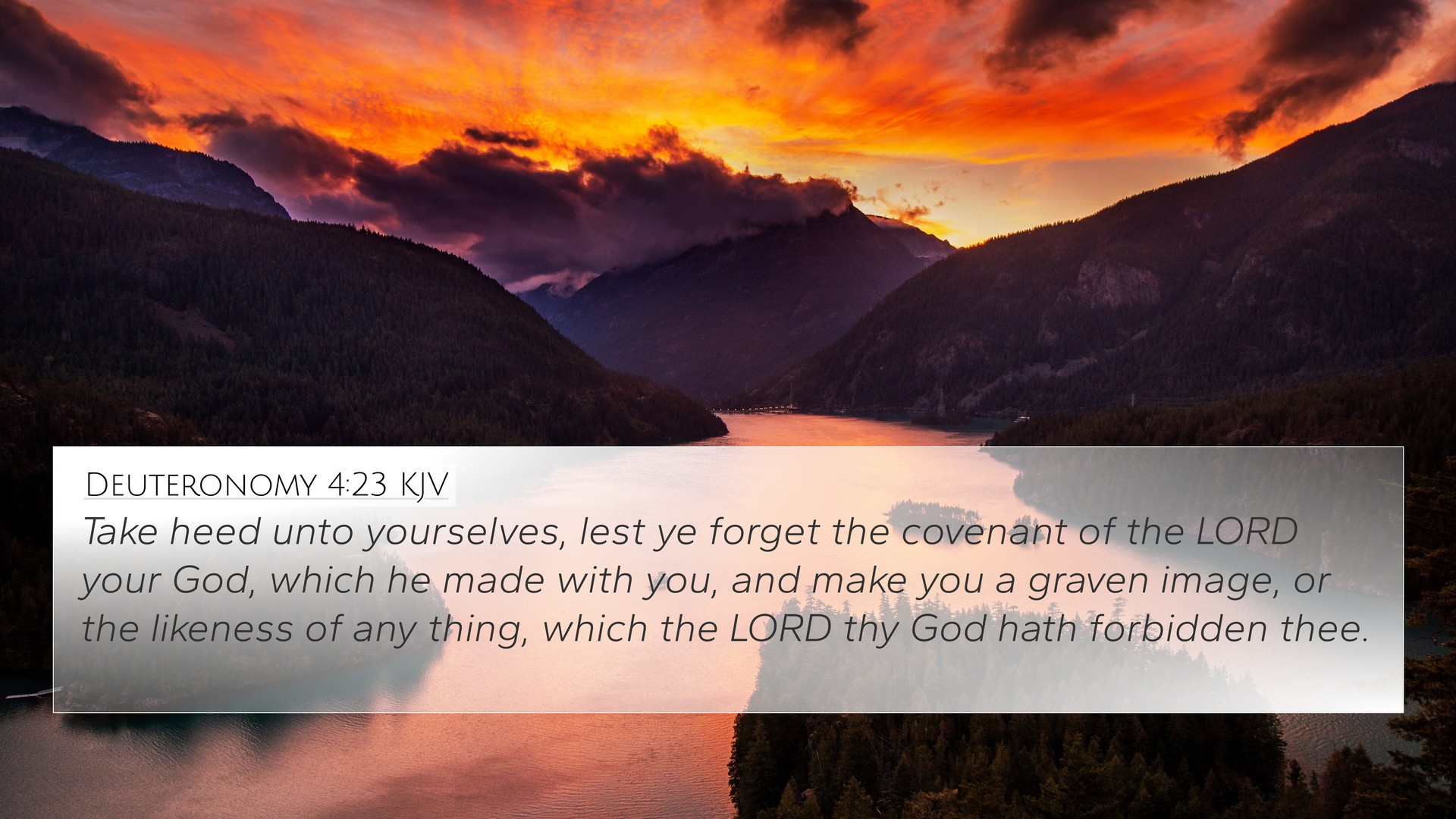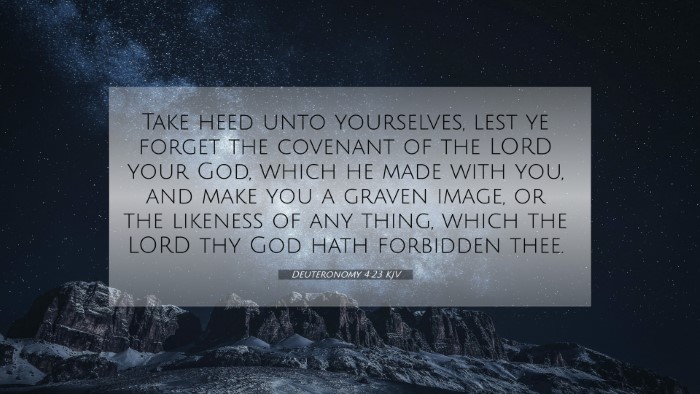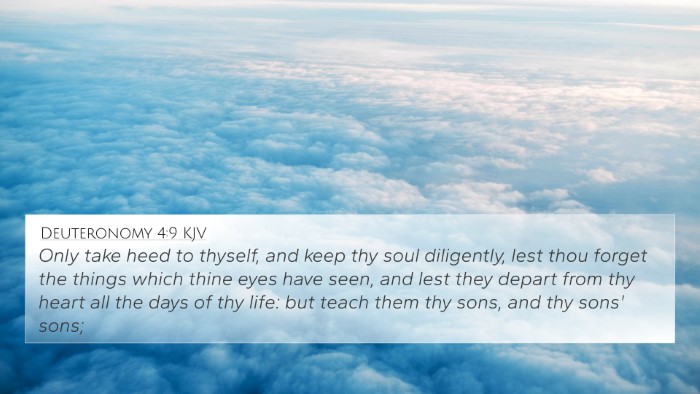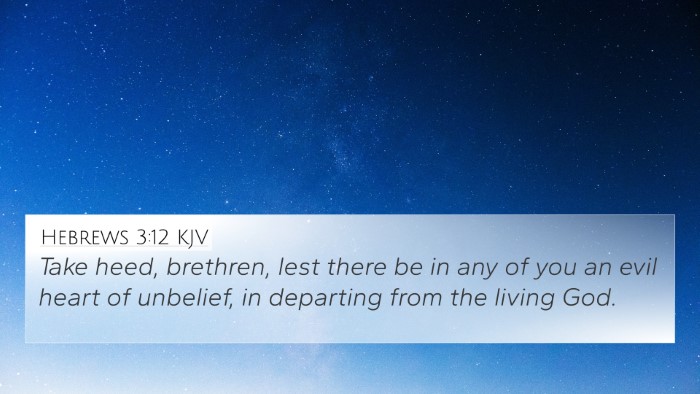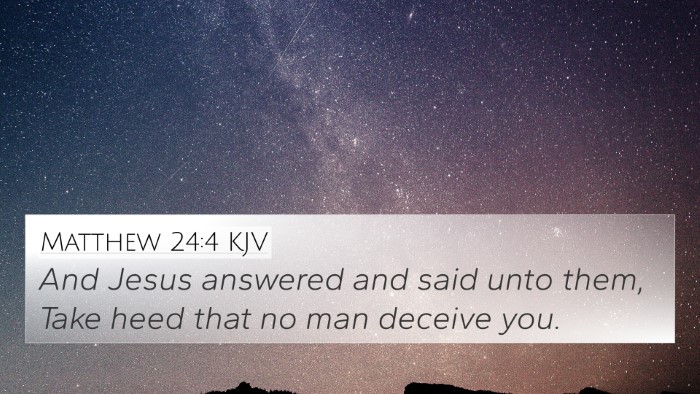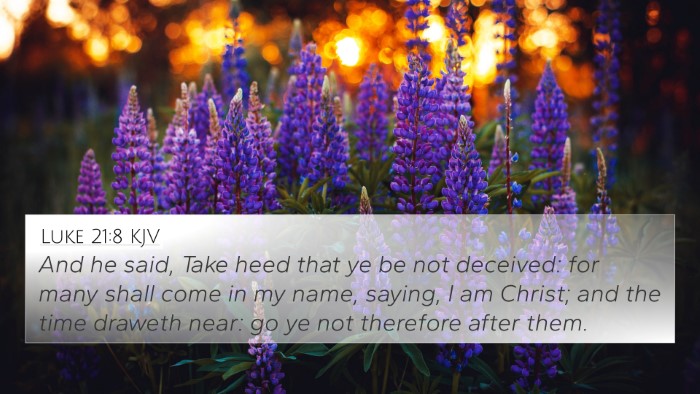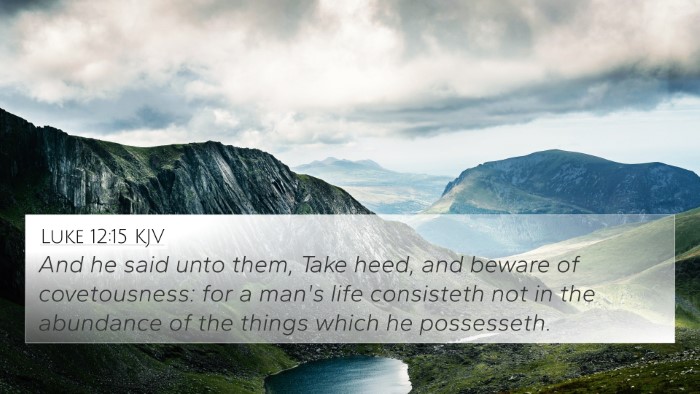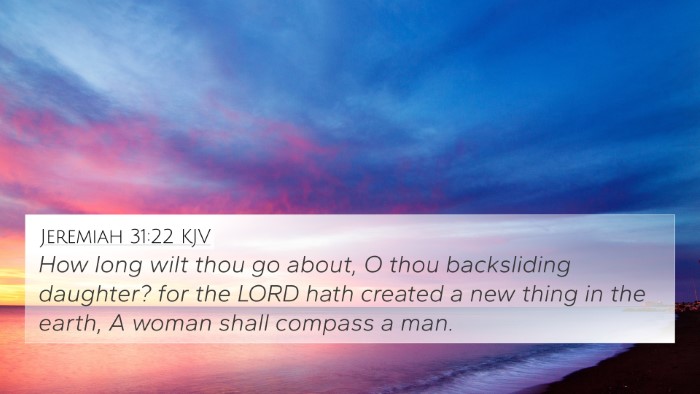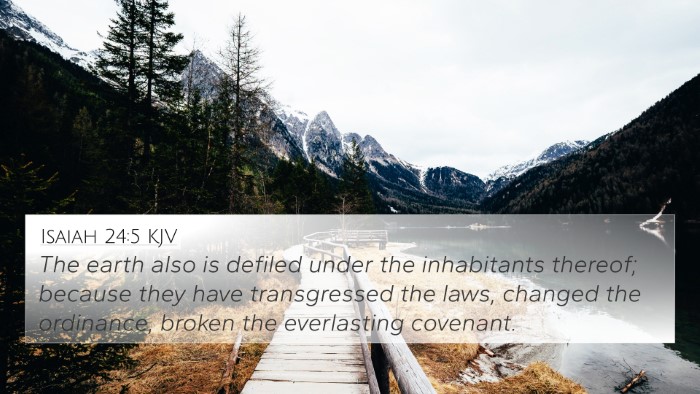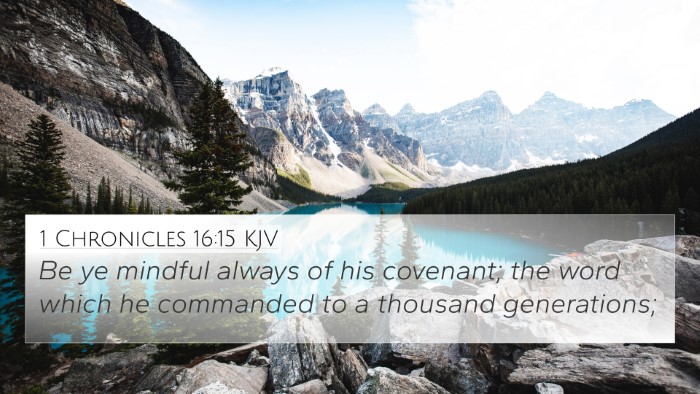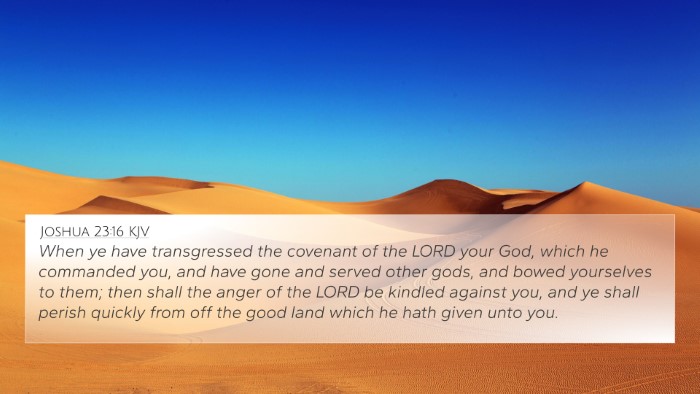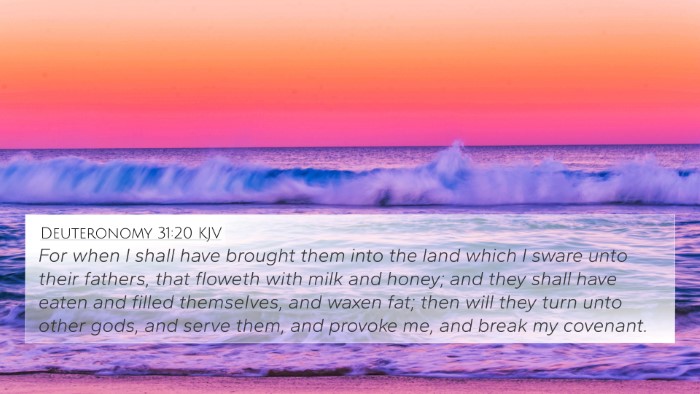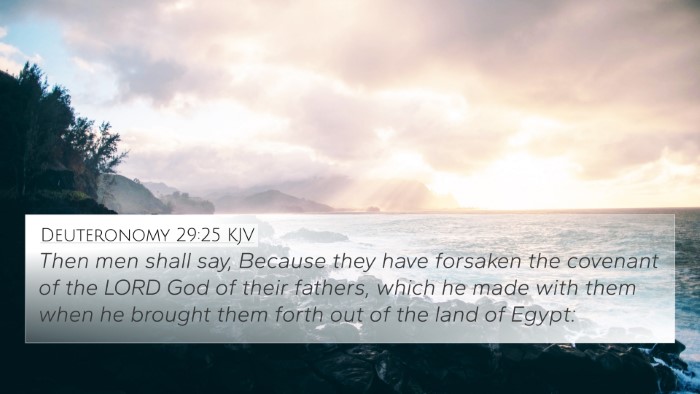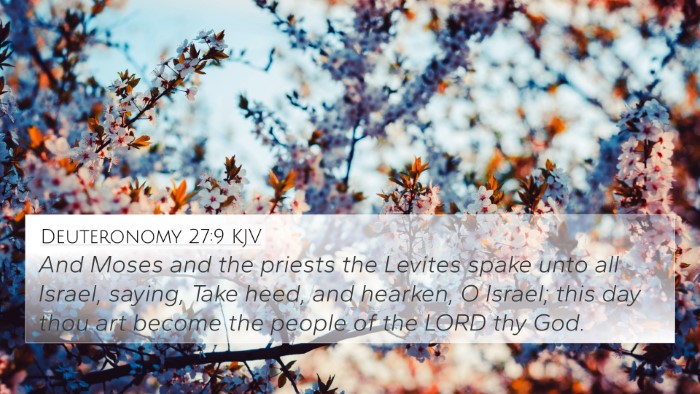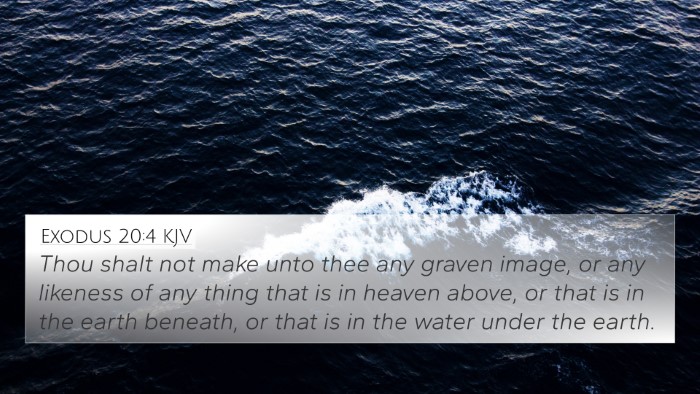Understanding Deuteronomy 4:23
Verse: "Take heed unto yourselves, lest ye forget the covenant of the LORD your God, which he made with you, and make you a graven image, or the likeness of any thing, which the LORD thy God hath forbidden thee."
This verse serves as a poignant reminder from Moses to the Israelites, emphasizing the importance of remembering God's covenant and the prohibitions against idolatry. It sets the stage for understanding the broader implications of faithfulness to God and the consequences of straying from His commands.
Key Insights from Public Domain Commentaries
Matthew Henry's Commentary
Henry notes that this verse is part of a larger discourse urging vigilance against idolatry. He emphasizes the need for self-examination and diligence in maintaining one’s relationship with God. Forgetting the covenant equates to a failure to acknowledge God's sovereignty and could lead to severe consequences. Henry highlights the necessity of active remembrance and discusses how the heart's inclination can lead one to stray.
Albert Barnes' Commentary
Barnes points out that the covenant mentioned serves as an essential thread in Israel’s identity and relationship with God. He argues that by forgetting this covenant, the people risk losing their unique standing as God's chosen ones. Barnes elaborates on the nature of the graven images, articulating how they represent a rejection of God's creative order and the danger of shifting allegiances from the true God to fabricated ones.
Adam Clarke's Commentary
Clarke contextualizes the verse within the historical narrative of the Israelites' journey. He stresses the importance of fidelity to God's commands and warns against the consequences of idolatry. Clarke's analysis includes a call for personal accountability in remembering God's commands. He further discusses how this verse illustrates the broader theme of spiritual vigilance across biblical texts.
Connections to Other Bible Verses
Deuteronomy 4:23 can be interconnected with several other Bible verses that amplify its themes and warnings:
- Exodus 20:4-5: “Thou shalt not make unto thee any graven image…” - A clear directive against idolatry, reinforcing the message of Deuteronomy 4:23.
- Deuteronomy 6:12: “Then beware lest thou forget the Lord…” - This verse mirrors the warning to remember God's law and his covenant.
- Joshua 23:16: “If ye transgress the covenant of the Lord your God…” - It highlights the consequences of breaking the covenant.
- 1 John 5:21: “Little children, keep yourselves from idols.” - A New Testament reflection on the ongoing relevance of this ancient warning.
- Romans 1:21-23: Discusses how people, despite knowing God, fell into idolatry - showing the consequences of forgetting God's revelation.
- Isaiah 44:9-20: Critique of idol-making, illustrating the futility of turning from God to false images.
- Hebrews 8:9: References to a new covenant, grounding the necessity of keeping faith in God and His commands.
Thematic Analysis
The verse emphasizes several key themes central to understanding the biblical narrative:
- Covenant Faithfulness: The importance of adhering to God’s promises.
- Idolatry: A recurring theme in Scripture that warns against the human tendency to worship created things rather than the Creator.
- Personal Responsibility: Emphasizes the individual's duty to remember and follow God's commands.
- Consequences of Disobedience: Highlights how forgetting God's covenant can lead to estrangement from Him.
Cross-Referencing Biblical Texts
When studying this verse, it is beneficial to engage in a cross-referencing method. Here are some tools and methods you can use:
- Bible Concordance: A valuable tool for finding cross-references and themes.
- Bible Cross-Reference System: Many study Bibles include cross-references that can provide insights into related scriptures.
- Cross-Reference Bible Study: A method that involves comparing themes and teachings across different books of the Bible.
- Bible Reference Resources: Utilize commentaries and study guides to gain deeper understanding.
Conclusion
Deuteronomy 4:23 invites deep reflection on our commitment to God and the call to remain vigilant against forgetfulness and idolatry. Through various commentaries and related scriptures, we can see how this message permeates the biblical narrative. By employing cross-referencing techniques, readers can further uncover the rich layers of meaning embedded within this and related biblical texts.
